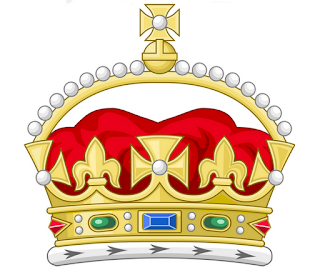Every year, Churches Together in St Neots holds a Good Friday procession to the Market Square where a combined service is held.
We'll return to consider how this impacts the local community in a moment, but first I'll describe the occasion.
This year the numbers were significantly lower than usual, perhaps because it was a bitterly cold day. The group of believers gathered outside St Mary's, walked to the church gate on Church Street, turned left into the High Street, and gathered in the Market Square.
The procession involves a simple banner stating who is walking (Churches Together), and a wooden cross as an emblem and statement of the events being remembered, the crucifixion and death of Jesus Christ. The walkers are silent because it's a solemn occasion, and there's a police presence because the walk takes place on the road rather than the pavement.
Once assembled in the Market Square there is a conventional church service with hymns, Bible readings and several short messages delivered by leaders from some of the churches represented.
Impact on local people - I didn't walk in the procession although I have done so in previous years. Donna was keen to walk and I took some photos and then joined the meeting in the Market Square.
I wanted to support Donna by walking with her but felt that Papa was guiding me not to. I've been rather uneasy about the walk in previous years; this time I felt more strongly that it was not the right thing for me to do. My sense on this is that by walking we are creating a minor inconvenience to the majority of people in St Neots. Most are not believers and I don't want to be remembered as a person who just gets in the way and holds up the traffic.
The purpose of the walk is partly to witness to those around that we are followers of Jesus, and partly to reach them with the good news he brought. But I feel sure that it is not be very useful and may even be counter productive. Better, perhaps, to try to engage with people in a less traditional and more effective way.
There are other things to consider. What do people make of the banner stating we are 'Churches Together'. I wonder if, rather than suggesting we are united, this doesn't confirm to many that we are a set of separate organisations. It doesn't really emphasise that we are one church, but rather that we are several.
The solemnity of the entire event, although understandable, is not likely to seem attractive to everyday people. To connect with the population we surely need to be more fun, more colourful, more interesting and more relevant.
Some alternatives - I certainly don't intend to criticise. I'm glad that there are people in the town who are willing to turn out on a cold day like this, to stand up and be seen, and to make the truth known to anyone who will listen. But I suspect few pay any attention.
Most people think they already know roughly what Christians believe and they don't see us as attractive or interesting. They typically presume us to be fuddy-duddy and irrelevant to the ordinary lives of ordinary people.
But there are alternative ways to reach people that are much more effective; alternatives that will play on the natural curiosity that is common to all people everywhere.
A few years ago there was a passion play in the town, and that got a lot of attention and made a real impact. I'm glad to see that there's a plan to repeat it in 2014. It's a colourful event full of action and interest and sound and colour. Many people followed the play from place to place in the town and watched.
Another alternative focusses on free hugs and the many other similar activities we can try. Once again these engage people's interest. As far as I could tell not a single person stopped to watch or listen to today's meeting. A few people watched very briefly as the procession passed by. But joining in with the free hugs a few weeks ago I was struck by how many people wanted to ask about it and listen while we explained.
Instead of trying to engage people it may be far better to do something unusual and intriguing so they will want to engage us. We need to spend less time and effort doing what people expect us to do, and put far more time and effort into doing what they do not expect.
Questions:
- Imagine yourself as an unbelieving onlooker. Which would you find more interesting, a clearly religious meeting in the middle of your town or someone giving away labelled fruit?
- What could you do locally to encourage people to come and ask you questions?
- Which will people find the more approachable, a group of forty or a group of two?
See also:
- Be the light (explore the site for more ideas to try in your own locality)
- Churches together
- Churches, the - Churches together in St Neots
- On the Market Square - Journeys of heart and mind





















